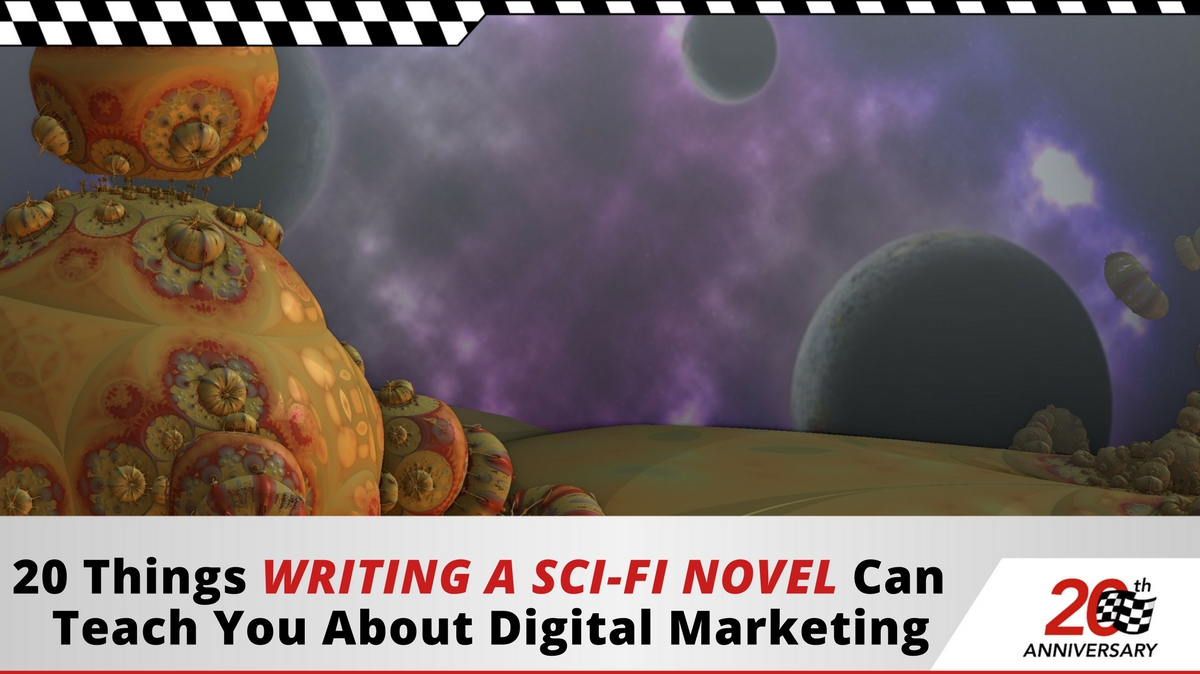
I am currently two-years deep in writing a new book. No, scratch that. Not just a book; a novel. More specifically, a time-travel, post-apocalyptic, political, sci-fi, thriller. Having gotten notes back from my editor/writing coach, I have just started the third draft. And I suspect this won’t be my final draft.
I’ve been writing for digital marketing for 20 years now, and I have also written quite a bit about how to write for digital marketing. If there is one thing that I can tell you about writing is this: Writing is hard.
As I embarked on pulling double writing duty by adding a novel to my profile, I had to learn how to write all over again. But now that I’m done with the initial story and have moved into fine-tuning mode, I look back on it all and see something unexpected. The concepts I needed to understand in order to write a good novel (and it’s good!) can also be applied back to digital marketing.
So take a journey with me to Fictiontown, and see what a good sci-fi story can teach us about becoming better digital marketers.
1. Have a problem to solve
Just as every book is about characters working through some sort of problem, your visitors are coming to you because they, too, have a problem of their own. Readers want to know first that you understand what they are going through and have a solution that meets their needs. And then it’s up to you to be able to solve it better than anyone else.
2. Exaggerate the problem, not the solution
In a novel, the problem must be big. HUGE, in fact. You’ll rarely find a good story about overcoming small problems.
In your marketing, it’s okay to use a bit of build up to explore your reader’s problems. Heck, for all they know, the problem really is bigger than they know!
But where it’s okay to hype the problem, be careful that you don’t do the same for the solution. If the solution sounds too good to be true, it probably is. Over-hyping it loses credibility.
3. Start with the end in mind
Not all content requires a full-scale, multi-point/sub-point outline, but you do need to know where you’re going and what you want the reader to learn. Without that, you’re just meandering and will wind up with a less-than-coherent piece of content. If you know the journey you want your readers to take, you’ll better articulate what they need to know.
4. Develop your story
There is nothing worse than reading a book (or watching a movie, for that matter) and seeing characters making huge leaps in logic. Forcing your website visitors to do the same is just as disconcerting.
It’s understandable that you want to get your visitors to the conversion as quickly as possible, but they can’t just jump right to the end. You have to lead them through your content so that by the time they reach the conversion/climax it makes perfect sense.
5. Stay in character
It’s aggravating to a reader to see a character do or say something that doesn’t fit their character simply because the author wants to move the story forward. Readers learn to love the characters because of who they are, so they must always act true to how they have been established.
In marketing, we call this, finding your voice.

Be who you are and stick to that. Find a voice that resonates with your audience, and don’t break away from that voice. If and when you do, you risk becoming something other than what your customers have fallen in love with.
6. Give your audience someone to root for
A common criticism I received from early drafts of my book is that the main character wasn’t likable enough. The readers were willing to go along for the ride, but they just couldn’t root for the guy. That’s a problem.
Your business is your main character and like a novel, you want your audience to be rooting for you to succeed. This is where having a compelling backstory comes into play. Or in the case of your website, a compelling About Us page that tells your company story. A good About Us page helps readers learn who you are and come alongside your team, especially if they can share your values. Never underestimate what can be achieved if your audience is rooting for you.
7. Don’t break the rules
My biggest complaint with sci-fi–and time travel specifically–is that too many people break the rules for the sake of the plot. That’s what we call plot holes. Even in fictional universes, you want your story to be believable and can only achieve that by rooting the plot in what we know works.
Digital marketing isn’t much different. There are reasons why certain things are done certain ways. It’s because that’s what works. Learn what the best practices are in your industry and follow them, at least until you know for sure they don’t.
8. Some rules were meant to be broken
In a novel, if you can find a legitimate and compelling reason to break the rules then you’re free to do so. Same with digital marketing. You start with convention, but you’re free to break convention if you find a better way. Always be experimenting with the rules to find out what still works and what rules are ready to be broken for a better onsite experience.
9. The first draft is crap
The first efforts at anything are rarely the best. A website is a work in progress. Even after you publish content, you can go back and update it, tweak it, and improve it. Be willing to find ways to improve… everything.
But, uh, just don’t George Lucas it!
10. The bad guys sometimes win, but the hero always overcomes
Marketing takes time. If you accept that your site is a work in progress then you accept the fact that you won’t win every battle. In fact, you’re the underdog. The big bad guy (competitor) starts out with the upper hand. But remember, perseverance (and a solid plan) always leads the hero (you!) to victory.
11. Don’t break the bubble
One of the first rules I learned in writing a novel is to never break the fictive bubble. Don’t do anything that forces the reader to stop and say, “Hey, that doesn’t make sense!” You have to keep the reader engaged and moving along with your story.
Same with your website. The moment your reader’s disengage with your content, you’ve lost them. The moment they have to think about what to do next, you’ve given them an opportunity to exit. Keep them engaged and moving through the conversion process.
12. Learn from the past
Your main character needs to undergo some sort of growth-change. They learn, grow, and overcome as the story evolves.
You should be learning, growing, and overcoming as a company as well. Don’t let a digital marketing mistake go to waste without learning how you can do better the next time around.
13. Stay rooted in the present
Even in a time-travel novel, too much focus on the future can be counterproductive. A story must feel relevant to us today.
Letting your customers know how you’ll meet their needs tomorrow is one thing, but always be sure you’re relevant to them today. They can always come back tomorrow for tomorrow’s value, but give them a reason to engage today.
14. Look to the future
Characters live in the present but they plan for the future. Similarly, your digital marketing efforts should always keep a firm footing in what is relevant today while also keeping an eye on the coming trends. If you don’t have at least one eye looking forward, you risk becoming irrelevant.
15. Everything is expendable
One of the best things about TV today is that storytellers are willing to kill off characters. Sooner or later certain tactics and strategies will outlive their usefulness. Be willing to kill them off. Killing off old characters and strategies leaves room for something new and fresh.
16. There is only one Steven King
And there is only one Apple and only one Google, etc. No matter how hard you work, there will always be someone better than you. Don’t look to be better than your competition at everything, just beat them at one thing. And then let that one thing lead to the next thing and the next. Focus on what you do and get great at it.
17. Success doesn’t happen overnight
Authors who are an overnight success spent months and years planning out their first novels. Every company that sprang up out of nowhere certainly sprouted over a lot of hard working days. It may take years for you to be an overnight success. The important thing isn’t how quickly you get there, but the foundation you build to achieve it.
18. Be willing to listen to criticism
Even the most accomplished writers don’t know everything. I know that I can’t be so attached to my story that I’m not willing to listen to critiques.
Business is the same. Learn from the wisdom of others. It’ll only make you stronger.
19. There are a hundred ways to do the same thing
No one has a monopoly on the “right” way to tell a story or run a business. Don’t look to mimic others who have succeeded before you, but instead find ways to be unique in a competitive space. Don’t second guess every move you make, just be willing to make moves and try something new.
20. You can’t cut corners until you’re a name brand
I admit it, I still read John Grisham. He hasn’t had a thrilling book in years, but he is still a solid storyteller. Do I wish he would go back to writing page-turners? Yep. But I think he’s gotten comfortable telling less complex stories.
The truth is, everyone looks for shortcuts. The more established you get, the more shortcuts you can take. But when you’re getting started shortcuts are the quickest path to irrelevance. In early days, you have to be the absolute best that you can be.
Would it be better if everyone always strived to be the best and didn’t take any shortcuts? Absolutely. Shortcuts are rarely ever a good long-term business strategy, so avoid them altogether if you can. But just because you see the other guys getting away with it, doesn’t mean you’ll be able to.
Write Your Own Digital Marketing Story
Every business and every product or service is nothing more than a story being told to an audience. The lessons I have learned as a novelist have already helped me be a better digital marketer. Lucky for you, you don’t have to write a novel to be a better digital marketing writer. Take my lessons and apply them liberally to your own business.

 “Sooner or later certain tactics and strategies will outlive their usefulness. Be willing to kill them off.” — Stoney deGeyter
“Sooner or later certain tactics and strategies will outlive their usefulness. Be willing to kill them off.” — Stoney deGeyter